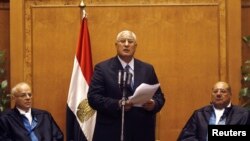DUBAI, UAE —
Gulf Arab states welcomed Egypt's interim leader on Thursday, hopeful his appointment would stem the rise of Islamists in the Middle East, but the military overthrow of an elected president drew a guarded response from Iran and condemnation from Turkey.
The United States expressed concern at the ouster of Mohamed Morsi on Wednesday and called for a swift return to democracy, as did the European Union. But they stopped short of calling it a coup, which might have led to sanctions.
The 54-nation African Union was likely to suspend Egypt for allowing "unconstitutional change", a senior AU source told Reuters.
For Gulf Arab states, which see Egypt as a strategic ally against any threat from non-Arab Iran across the Gulf, the appointment of constitutional court chief Adly Mansour as interim leader was met with congratulations and evident relief.
"We followed with all consideration and satisfaction the national consensus that your brotherly country is witnessing, and which had played a prominent role in leading Egypt peacefully out of the crisis it had faced," said the president of the United Arab Emirates, Sheikh Khalifa bin Zayed al-Nahayan.
Kuwait's ruler, Sheikh Sabah al-Ahmad al-Sabah, was quoted as praising Egypt's armed forces for the "positive and historic role" they played in preserving stability.
'Critical period'
Saudi King Abdullah sent a message of congratulations on Wednesday "in this critical period of... history", and Qatar, the only Gulf Arab state that backed Morsi’s Muslim Brotherhood, welcomed the new leader on Thursday.
The official Qatar news agency reported that cables of congratulation had been sent to Mansour by Qatar's new emir, Sheikh Tamim bin Hamad al-Thani.
Qatar has been a major financier of Islamist groups around the Arab World and had provided billions of dollars in aid to Egypt since the 2011 revolution that ended the autocratic rule of Hosni Mubarak.
Iran, which sought to repair its strained ties with Egypt after Morsi's election a year ago, gave a guarded response, calling for the people's "legitimate demands" to be fulfilled and warning of "foreign and enemy opportunism".
Morsi visited Tehran on one of his first official trips abroad, but the two countries have found themselves supporting opposite sides of a civil war in Syria that has taken on increasingly sectarian overtones.
"Certainly the resistant nation of Egypt will protect its independence and greatness from foreign and enemy opportunism during the difficult conditions that follow," Fars news agency quoted Foreign Ministry spokesman Abbas Araqchi as saying.
Syria, fighting to crush a two-year-old uprising against President Bashar al-Assad, urged Morsi to step down on Wednesday and realize "that the overwhelming majority of the Egyptian people reject him," Information Minister Omran Zoabi was quoted as saying by state news agency SANA.
Neighboring Israel avoided any show of satisfaction over Morsi's ouster, although a confidant of Prime Minister Benjamin Netanyahu expressed hope Mansour's appointment would lead to the restoration of largely frozen contacts with Cairo.
`Yesterday's events strengthen the feeling that perhaps we have passed the bad period and perhaps now there will be a chance to have diplomatic ties with whomever will govern Egypt in the near future," Tzachi Hanegbi told Army Radio.
'Illicit means'
Straddling the Middle East and Europe, Turkey was harshly critical of Egypt's army, saying its overthrow of Morsi was "unacceptable" - a marked difference from its would-be partners in the European Union, which avoided repeated questions on whether it was a military coup.
"It is unacceptable for a government that has come to power through democratic elections to be toppled through illicit means and, even more, a military coup," Turkish Foreign Minister Ahmet Davutoglu told reporters in Istanbul.
Turkey has a history of military coups and is run by a government with Islamist roots which has faced weeks of often violent protests.
Some Western countries were concerned about the overthrow.
"The dismissal of the democratically elected President Morsi by the military is very questionable. Military intervention as a way to resolve conflicts in a democratic system is not acceptable," Austrian Deputy Chancellor and Foreign Minister Michael Spindelegger said in a statement.
NATO chief Anders Fogh Rasmussen said he was gravely concerned.
U.S. President Barack Obama stopped short of condemning the move. "I now call on the Egyptian military to move quickly and responsibly to return full authority back to a democratically elected civilian government as soon as possible through an inclusive and transparent process," he said in a statement.
The United States expressed concern at the ouster of Mohamed Morsi on Wednesday and called for a swift return to democracy, as did the European Union. But they stopped short of calling it a coup, which might have led to sanctions.
The 54-nation African Union was likely to suspend Egypt for allowing "unconstitutional change", a senior AU source told Reuters.
For Gulf Arab states, which see Egypt as a strategic ally against any threat from non-Arab Iran across the Gulf, the appointment of constitutional court chief Adly Mansour as interim leader was met with congratulations and evident relief.
"We followed with all consideration and satisfaction the national consensus that your brotherly country is witnessing, and which had played a prominent role in leading Egypt peacefully out of the crisis it had faced," said the president of the United Arab Emirates, Sheikh Khalifa bin Zayed al-Nahayan.
Kuwait's ruler, Sheikh Sabah al-Ahmad al-Sabah, was quoted as praising Egypt's armed forces for the "positive and historic role" they played in preserving stability.
'Critical period'
Saudi King Abdullah sent a message of congratulations on Wednesday "in this critical period of... history", and Qatar, the only Gulf Arab state that backed Morsi’s Muslim Brotherhood, welcomed the new leader on Thursday.
The official Qatar news agency reported that cables of congratulation had been sent to Mansour by Qatar's new emir, Sheikh Tamim bin Hamad al-Thani.
Qatar has been a major financier of Islamist groups around the Arab World and had provided billions of dollars in aid to Egypt since the 2011 revolution that ended the autocratic rule of Hosni Mubarak.
Iran, which sought to repair its strained ties with Egypt after Morsi's election a year ago, gave a guarded response, calling for the people's "legitimate demands" to be fulfilled and warning of "foreign and enemy opportunism".
Morsi visited Tehran on one of his first official trips abroad, but the two countries have found themselves supporting opposite sides of a civil war in Syria that has taken on increasingly sectarian overtones.
"Certainly the resistant nation of Egypt will protect its independence and greatness from foreign and enemy opportunism during the difficult conditions that follow," Fars news agency quoted Foreign Ministry spokesman Abbas Araqchi as saying.
Syria, fighting to crush a two-year-old uprising against President Bashar al-Assad, urged Morsi to step down on Wednesday and realize "that the overwhelming majority of the Egyptian people reject him," Information Minister Omran Zoabi was quoted as saying by state news agency SANA.
Neighboring Israel avoided any show of satisfaction over Morsi's ouster, although a confidant of Prime Minister Benjamin Netanyahu expressed hope Mansour's appointment would lead to the restoration of largely frozen contacts with Cairo.
`Yesterday's events strengthen the feeling that perhaps we have passed the bad period and perhaps now there will be a chance to have diplomatic ties with whomever will govern Egypt in the near future," Tzachi Hanegbi told Army Radio.
'Illicit means'
Straddling the Middle East and Europe, Turkey was harshly critical of Egypt's army, saying its overthrow of Morsi was "unacceptable" - a marked difference from its would-be partners in the European Union, which avoided repeated questions on whether it was a military coup.
"It is unacceptable for a government that has come to power through democratic elections to be toppled through illicit means and, even more, a military coup," Turkish Foreign Minister Ahmet Davutoglu told reporters in Istanbul.
Turkey has a history of military coups and is run by a government with Islamist roots which has faced weeks of often violent protests.
Some Western countries were concerned about the overthrow.
"The dismissal of the democratically elected President Morsi by the military is very questionable. Military intervention as a way to resolve conflicts in a democratic system is not acceptable," Austrian Deputy Chancellor and Foreign Minister Michael Spindelegger said in a statement.
NATO chief Anders Fogh Rasmussen said he was gravely concerned.
U.S. President Barack Obama stopped short of condemning the move. "I now call on the Egyptian military to move quickly and responsibly to return full authority back to a democratically elected civilian government as soon as possible through an inclusive and transparent process," he said in a statement.






